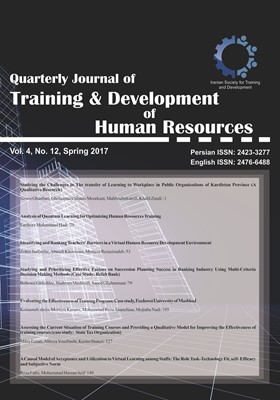Studying the Challenges in the Transfer of Learning to Workplace in Public Organizations of Kurdistan Province (A Qualitative Research)
Subject Areas :Sirous Ghanbari 1 , gholamreza shams mourkani 2 , mahboobeh arefi 3 , khalil zandi 4
1 -
2 - دانشگاه شهید بهشتی
3 -
4 -
Keywords: Transfer of Learning to Workplace, Personal Barriers, Training Barriers, Organizational Barriers.,
Abstract :
The current qualitative study tried to study the challenges in the transfer of learning to workplace. The field study was public organizations of Kurdistan province and its research method was Grounded Theory based on a systematic approach. A group of 48 people including employees, supervisors, experts and education officials, senior executives, and teachers and specialists of training and human resource development were studied by purposive sampling method. Semi-structured individual interviews were used for gathering data and at the same time, the interviews were analyzed by open coding, axial coding, selective coding and annotating. The validity of analysis was confirmed using member checking and triangulation techniques. Based on the results, the most important causes of indifference to the transfer of learning included: motivational barriers, barriers related to individual characteristics, improper timing, barriers to teaching, content and evaluation, administrative barriers, supportive barriers and obstacles focused on the job. Factors underlying indifference to the transfer of learning Included: Non-supportive organizational culture, disturbing administrative system, and climate of organizational indifference. Employee strategies in the face of such a situation may be reactive behaviors, negative behaviors and positive compensatory behaviors. The consequences of such a situation, at the individual level are Job stillness, job procrastination, lack of creation and deviant behaviors; in addition to, consequences at the individual level are Loss of educational investment and reduce organizational success.
پارسا، عبداله و قنبری همایکوه، امیر. (1388). بررسی میزان سودمندی برنامههای آموزش ضمن خدمت و رابطه آن با رشد دانش و مهارتهای شغلی در دانشگاه شهید چمران اهواز. مجله علوم تربیتی دانشگاه شهید چمران اهواز، 5 (1): 112-87.
دادگرپناه، ژیلا و عرفانی خانقاهی، معصومه. (1392). پیشبینی رابطه ابعاد جو یادگیری با انتقال آموزش در بیمارستان میلاد تهران و ارائه مدل. فصلنامه بیمارستان، 12 (4): 71-63.
سجادی، محمدتقی؛ کیان، مرجان و صفایی موحد، سعید. (1393). آسیبشناسی پدیده انتقال آموزش در آموزشهای ضمن خدمت سازمان آموزش و پرورش (مطالعه موردی استان خراسان جنوبی). فصلنامه آموزش و توسعه منابع انسانی، 1 (3): 24-1.
شمس مورکانی، غلامرضا؛ صفایی موحد، سعید و فاطمی صفت، علی. (1394). آسیبشناسی فعالیتهای آموزش و بهسازی منابع انسانی بر اساس مدل سه شاخهگی (مورد مطالعه: صنایع الکترونیکی فجر). فصلنامه آموزش و توسعه منابع انسانی، 2 (7): 100-71.
یوزباشی، علیرضا؛ ابیلی، خدایار؛ خرازی، سیدکمال و سبحانینژاد، مهدی. (1395). عوامل سازمانی زمینهساز انتقال یادگیری به محیط کار (مطالعه موردی؛ شرکت ملی گاز ایران). فصلنامه آموزش و توسعه منابع انسانی، 3 (9): 45-21.
Bhatti, MA.; Battour, MM.; Sundram, VPK. & Othman, AA. (2013). Transfer of Training: Does It Truly Happen? European Journal of Training and Development, 37 (3): 273 – 297.
Brown, T C. & McCracken, M. (2009). Building a Bridge of Understanding. Journal of European Industrial Training, 33 (6): 492 – 512.
Cheng, E W. & Ho, D C. (2001). A Review of Transfer of Training Studies in the Past Decade. Personnel Review, 30 (1): 102 – 118.
Cheng, Eddie W.L.; Sanders, K. & Hampson, I. (2015).An Intention-based Model of Transfer of Training. Management Research Review, 38 (8): 908-928.
Choi, H J. & Park, J. (2014).The Relationship Between Learning Transfer Climates and Innovation in Public and Private Organizations in Korea. International Journal of Manpower, 35 (7): 956 – 972.
Dirani, K. (2012). Professional Training as a Strategy for Staff Development. European Journal of Training and Development, 36 (2/3): 158 – 178.
Elena, R. (2014). Effectiveness Evaluation of Training Programs For Disadvantaged Targets. Procedia - Social and Behavioral Sciences, (141): 1239 – 1243.
Hurt, KJ. (2016). A Theoretical Model of Training and its Transference: the Pivotal Role of Top Management Team Composition and Characteristics, Human Resource Development International, 19 (1): 44-66.
Ikhlas Khan, M. (2012).the Impact of Training and Motivation on Performance of Employees. Business Review, 7 (2): 84-95.
Kontoghiorghes, C. (2014). A Systemic Perspective of Training Transfer. In: Käthe, S: Transfer of Learning in Organizations. Springer International Publishing, 65-79.
Krishnamani, S. & Haider, Y. (2016). Transfer of Learning from Executive Education Programs in Developing Economies: the Key role of Motivation. Development and Learning in Organizations: An International Journal, 30 (1): 15-18.
Krompho, S. & Porrawatpreyakorn, N. (2013). Identifying Factors Influencing Hybrid Self-regulated and Collaborative Learning: Toward an End-User Training Framework. In: Papasratorn, B., Charoenkitkarn, N., Vanijja, V., Chongsuphajaisiddhi, V: Advances in Information Technology, Springer International Publishing Switzerland: 120-130.
Lancaster, S.; Milia, LD. & Cameron, R. (2013). Supervisor Behaviors that Facilitate Training Transfer. Journal of Workplace Learning, 25 (1): 6-22.
Leach, MP. & Liu, AH. (2003). Investigating Interrelationships among Sales Training Evaluation Methods. Journal of Personal Selling & Sales Management, 23 (4): 327-339.
Leimbach, M. (2010). Learning Transfer Model: a Research-driven Approach to Enhancing Learning Effectiveness. Industrial and Commercial Training, 42 (2): 81 – 86.
Pineda, P. (2010). Evaluation of Training in Organizations: a Proposal for an Integrated Model. Journal of European Industrial Training, 34 (7): 673 – 693.
Renta-Davids, A.; Jiménez-González, JM.; Fandos-Garrido, M. & González-Soto, AP. (2014). Transfer of Learning .European Journal of Training and Development, 38 (8): 728 – 744.
Robson, F. & Mavin, Sh. (2014). Evaluating Training and Development in UK Universities: Staff Perceptions. European Journal of Training and Development, 38 (6): 553 – 569.
Steensma, H. & Groeneveld, K. (2012).Evaluating a Training Using the Four Levels Model. Journal of Workplace Learning, 22 (95): 319-331.
Velada, R. & Caetano, A. (2007). Training Transfer: the Mediating Role of Perception of Learning. Journal of European Industrial Training, 31 (4): 283 – 296.
Wenzel, R. & Cordery, J. (2014). Training Transfer Research: A Manager’s Guide and Bibliography. Australian Institute of Management – Western Australia, Perth.


